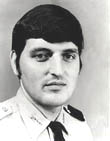Reprinted from the Stockton Record
Sheriff’s Deputy Michael Arthur Coleman, 30, who was shot and fatally wounded during a narcotics raid recently, died five minutes after his father succumbed to a heart attack.
Coleman was shot while assisting members of a Metro Narcotics Task Force team serving a search warrant.
Coleman’s father, Floyd Woniger Coleman, 70, an auxiliary sheriff’s deputy, died of a heart attack shortly after learning his son had been shot.
The senior Coleman was pronounced dead five minutes before his son by the doctor who then moved to another room at St. Joseph’s Hospital and made the same pronouncement of the injured officer.
The shooting of Coleman was almost a carbon copy of the fatal shooting of Police Officer Nicholas Cecchetti, son of Police Chief Julio A. Cecchetti, four years ago. It too took place when a narcotics search warrant was being served.
Coleman was shot, homicide investigators said, by Karen Frances Allen, 31, when a four-man Metro team attempted to serve a search warrant on her common-law husband, Renoldo Black, 31, at their residence at about 2:45 p.m.
A single .38 caliber bullet, one of three reportedly fired by Allen, hit Coleman under the right arm and then careened through his body to strike his aorta, a heart artery.
Allen, now under guard at San Joaquin General Hospital, was shot twice by police gunfire. She was wounded in the groin and in the arm.
Metro officers found a small amount of cocaine, placidly and amphetamines at the home. Black was charged with possessing the drugs in quantities sufficient for sale.
The dead deputy’s father was being transported from the Sheriff’s Office shooting range on Mathews Road to St. Joseph’s Hospital when he collapsed. Deputies Jerry Nakamura and John DeLeon, who had been sent to pick him up, said the father collapsed in their sheriff’s car.
After an all night investigation, homicide Detective Sgts. Wilson Stewart and David Knickerbocker and Metro Capt. Dennis Perry believe the following took place at the neatly kept Acacia Street residence.
Sheriff’s Sgt. Mike Junker and Police Officers Larry Moore and David Bentz, armed with the search warrant, went to the Allen-Black residence. They were wearing bulletproof vests.
Coleman who did not have a vest joined them at the scene.
It was decided that Coleman, because he was not wearing a bulletproof vest, would handle the reading of the search warrant and assist the other officers in the search once the residence had been secured.
He was to stand back away from the door when the officers approached.
Bentz and Moore said the front door to the home was open when they arrived but a screen door was closed.
Because they believed the people inside might be arming themselves or destroying evidence, Moore and Bentz attempted to kick open the door.
After three unsuccessful tires, the door was opened from the inside and Allen, standing back several feet, opened fire using a two-handed pistol-firing stance.
Coleman was standing in the yard, several feet away from the door.
Two mysteries surround what happened next:
Which one of Allen’s bullets struck Coleman is unknown.
Exactly where he was standing also is unknown.
Detectives are speculating that the first bullet she fired might have hit him, yet he still was able to fire six shots from his service revolver.
In all, 10 shots were fired by the police officers. It is not known which officer’s bullets struck Allen and incapacitated her.
After the shooting which lasted only a matter of seconds, Coleman turned to Sgt. Junker and said, “I’ve been shot.”
He staggered about 10 feet and collapsed.
Paramedics worked over the injured officer in an effort to restore vital functions before Coleman was rushed to the hospital. Doctors there continued emergency treatment until he was officially pronounced dead.
Capt. Perry, who paid high tribute to Coleman as an officer, said he still does not know how he became involved in the shooting.
“Perhaps he reacted as any good police officer would. He may have seen his fellow officers were having trouble getting into the home, and he went to help them. Maybe there were shots fired before he moved in.
“The officers who were there said everything happened very, very fast.”
Coleman, who requested a transfer from sheriff’s patrol duties to the Metro Narcotics Task Force, joined the team last July.
“He was a good all-around officer,” said Sheriff’s Inspector Jerry Krein, also a member of the Metro unit.
“I was very happy to see him come over here. He was a damn good cop.”
Sgt. Stewart, who questioned Allen at the hospital, said she admitted having “given herself a fix” of heroin about 30 minutes before the police officers arrived.
She denied closing the door, Stewart said, and Black reportedly admitted later that it was he who saw the officers approaching and shut it.
He denies, Stewart said, hearing the officer knock at the door or announce loudly, as is custom, the service of a search warrant.
Allen told Stewart she was in the bedroom, heard her dogs barking, and walked into the living room where she could see the uniformed officers approaching across her lawn.
Claiming she did not know who they were, she went back to the bedroom, picked up the .38-caliber pistol off of a dresser and returned to the living room.
She denied to Stewart that it was she who opened the door, but she did say she fired after it was opened.
Investigators checked the door during the night, and said it had not been forced open by the police despite their efforts to kick it in.


Tributes in honor of Deputy Michael A. Coleman
Stockton Police SWAT, Retired
Mike and I sat next to each other during DEA school. My wife and I were driving down Filbert, when we saw a Police car blocking a side street. I asked what’s going on, and was told an deputy was shot during a narcotics search warrant. Officer Nick Cecchetti was killed, also serving a narcotics search warrant.
SWAT served all search warrants afterwards. We did hundreds. Miss, and love you both.